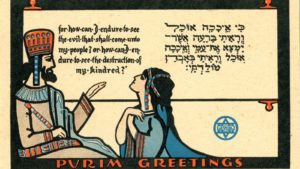
- This event has passed.
Purim begins at sundown
The festival of Purim is celebrated every year on the 14th of the Hebrew month of Adar, in late winter or early spring. It commemorates the salvation of the Jewish people in ancient Persia from Haman’s plot “to destroy, kill and annihilate all the Jews,young and old, infants and women, in a single day,” as recorded in the Megillah (Book of Esther).
Purim means “lots” in ancient Persian. The holiday was thus named since Haman had thrown lots to determine when he would carry out his diabolical scheme. You can pronounce this name many ways. In Eastern tradition, it is called poo-REEM. Among Westerners, it is often called PUH-rim. Some Central-European communities even call it PEE-rim.
In addition to the miracle of Jewish survival despite the efforts of our enemies, Purim celebrates the Lord’s intimate involvement in every aspect of this world. Even though there were no overt miracles recorded in the Megillah — indeed, the Lord’s name is not even mentioned once — the Lord was actively “pulling the strings” to care for the Jewish nation.
Additionally, Haman’s edict catalyzed a spiritual revival among the Jews. In a sense, this was even more significant than the Covenant at Sinai — an overwhelming spiritual experience that compelled the Jews to accept the Torah — since it occurred of their own volition, even as they were scattered among the Persian people and immersed in their culture. It was in the merit of this spiritual reawakening that the Lord orchestrated their salvation.
For a four minute video on the story of Esther, go to https://www.youtube.com/watch?v=aZe6PdH7Oas
See https://www.chabad.org/ for more information.

